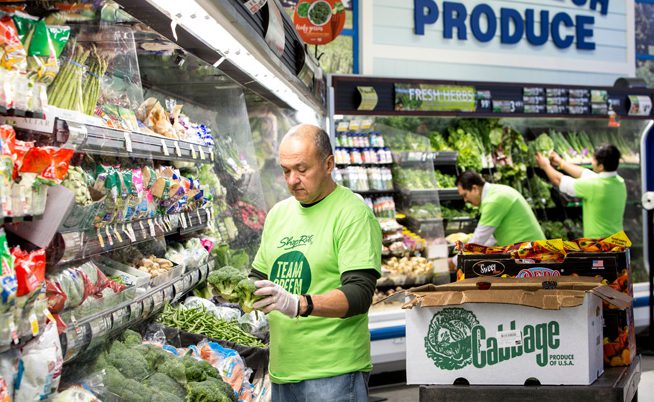ShopRite associates take special care to keep unsold food and food containers out of landfills.
When you’re shopping at your local ShopRite, you probably aren’t thinking about what happens to the food you don’tbuy. But many ShopRites are working hard behind the scenes to keep unsold food and food containers out of landfills.
Let’s follow the sustainable journey of a few of your favorite food choices to learn more.
 Feeding the Hungry
Feeding the Hungry
Sometimes, the path from farm to store shelves isn’t perfectly smooth. For example, a can of peas might end up slightly dented. Other times, items don’t sell as quickly as expected and are approaching their sell-by dates. These products are still tasty and safe to eat.
So what happens to them? Brown’s Super Stores, which operates 10 ShopRites in Pennsylvania, donates them to local food banks. Doing so involves more work than throwing the food away, said David Deets, director of store development for Brown’s.
“But from an environmental and community standpoint,” Deets said, “it’s the right thing to do.”

Supporting the Food Cycle
Donation is Brown’s first priority for unsold food, and the same is true for the 11 Grade A ShopRites that Dominick Cingari and his family own in Connecticut. But not every unsold item is suitable for donation. For example, a bag of Wholesome Pantry baby carrots might get torn.
ShopRite associates who spot that torn bag will take it to the back room and put the carrots into a special bin. Soon, a truck arrives to empty the bin and whisk those baby carrots off to a composting facility. Workers there inspect the compost to ensure the carrots and everything else are free from any non-compostable material, such as packaging. Next, they add a mixture to the compost to speed up decomposition. Then the machine goes to work to turn the produce into compost.
“It turns the compost every morning,” Cingari said. “That circulation helps it break down faster.”
 Soon, those Wholesome Pantry carrots have morphed into a nutrient-rich soil enhancer, which the composting company sells to consumers and farmers, who use it to grow new crops.
Soon, those Wholesome Pantry carrots have morphed into a nutrient-rich soil enhancer, which the composting company sells to consumers and farmers, who use it to grow new crops.
“So even though that material never worked out as a carrot, it’s going to work out as a fertilizer,” Cingari said. “That’s the best fertilizer you can get, and it’s better for the environment.”
Cingari and his team members have some innovative ideas to make this process even more sustainable. In the meantime, his stores’ composting efforts keep food waste out of landfills, and the end product helps reduce the need for chemical fertilizers.
Turning Deli Pails into Park Benches
 ShopRite stores divert more than food waste from landfills. They also recycle a wide range of materials, including cardboard and plastic bags. Even the pails used in the deli to hold condiments get recycled into toys, picnic tables and park benches.
ShopRite stores divert more than food waste from landfills. They also recycle a wide range of materials, including cardboard and plastic bags. Even the pails used in the deli to hold condiments get recycled into toys, picnic tables and park benches.
The trip from the deli to the park begins once those deli pails are empty. They are rinsed out at the store and then travel to ShopRite’s own materials recycling facility in Elizabeth, New Jersey. There, a baler – similar to a hay baler used on a farm – compresses the buckets before they go to the processor.
At the processor, the compressed pails are washed, shredded and melted into plastic pellets. Now, they’re almost ready to be transformed.
 Manufacturers take the pellets and melt them down to make new products, some of which you might find yourself relaxing on during your next trip to the park.
Manufacturers take the pellets and melt them down to make new products, some of which you might find yourself relaxing on during your next trip to the park.
